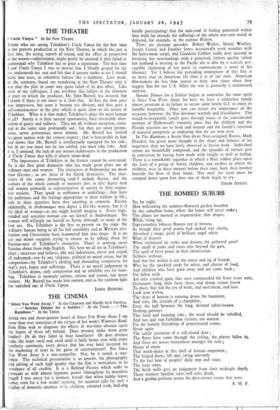THE THEATRE
THOSE who are seeing Tchekhov's Uncle Vanya for the first time in the present production at the New Theatre, in which the cast it first rate, the acting superb all round, and the effect in proportion to the means—infinitesimal, might partly be excused if they failed to understand why Tchekhov has so great a reputation. The first time I saw Uncle Vanya I was so moved that I blindly groped for my hat underneath my seat and felt that if anyone spoke to me I should burst into tears, or otherwise behave like a madman. Last week, on the contrary, found me wondering at the New Theatre why it was that the play in some way quite failed of its due effect. Like most of my colleagues, I can attribute this failure to the slowness of pace on which the producer, Mr. John Burrell, has insisted, but I doubt if there is not more in it than that. At first the slow pace was impressive, but soon it became too obvious, and thus gave a self-consciousness to the play which is quite alien to the nature of Tchekhov. What is it that makes Tchekhov's plays the most human of all? Surely it is their natural spontaneity, their irresistible alter- nation of gaiety and sadness. They are all, without exception, comic and at the same time profoundly sad ; but they are never preten- tious, never portentous, never solemn. Mr. Burrell has treated his great author with the utmost respect ; that is honourable in him and shows that Mr. Burrell is intellectually equipped for his task ; but in art you must not be too careful, you must take risks. And it is, I contend, the lack of any joyous recklessness in the production of Uncle Vanya that kills it almost stone-dead.
The importance of Tchekhov in the theatre cannot be over-rated. He is the first great dramatist who has made great plays out of ordinary men and women. The characters of Shakespeare are more than life-size ; so are those of the Greek dramatists. The char- acters of the comic dramatists. (and I include Racine, and the authors of the whole comedy of manners also, in this) depict men and women primarily as representatives of society in their respec- tive stations. They speak as noblemen or underlings ; they have the ambitions and the feelings appropriate to their stations in life ; only in their appetites have they anything in common. Racine, admittedly, in Andromaque may depict a life-like woman, but it is the ideal of woman—as she might herself imagine it. Every high- minded and sensitive woman can see herself as Andromaque. No woman will willingly see herself as Sonia, although so many of the best are. No, Tchekhov is the first to present on the stage the ordinary human being in all his full sensibility and as Western civi- lisation and Christianity have hammered him into shape. It is no use our minor escapists trying to excuse us by talking about the Russian-ness of Tchekhov's characters. There is nothing more Russian about them then English. No, here we all are in Tchekhov's plays successes and failures, idle and industrious, clever and stupid, all redeemed—not by any religious, political or moral virtue, but by compassion—by Tchekhov's abiding and abounding compassion for man's joys, hopes and sufferings. There is no moral judgement in Tchekhov's drama, only compassion and an infallible eye for hum- bug. Tchekhov is intensely serious, serious and joyous, but never earnest. Mr. Burrell has made him earnest, and so the rainbow light has vanished out of Uncle Vanya.
JAMES REDFERN.


























 Previous page
Previous page